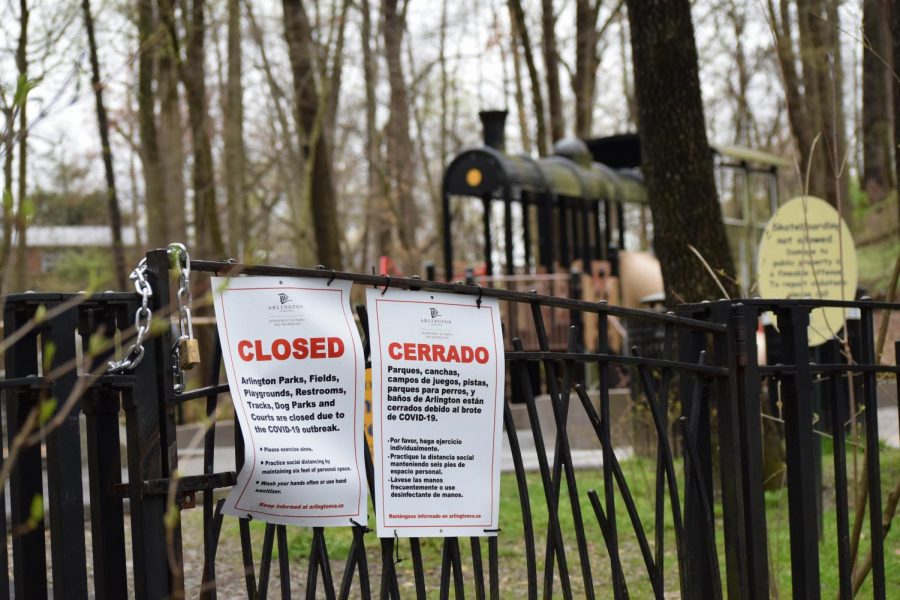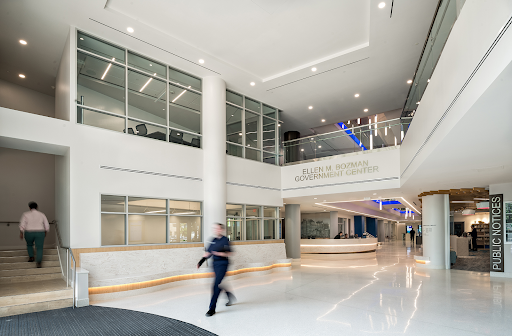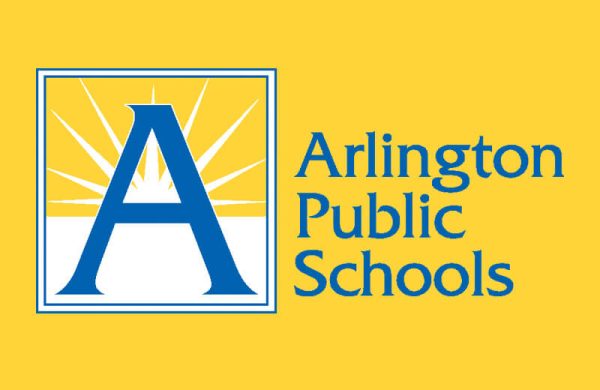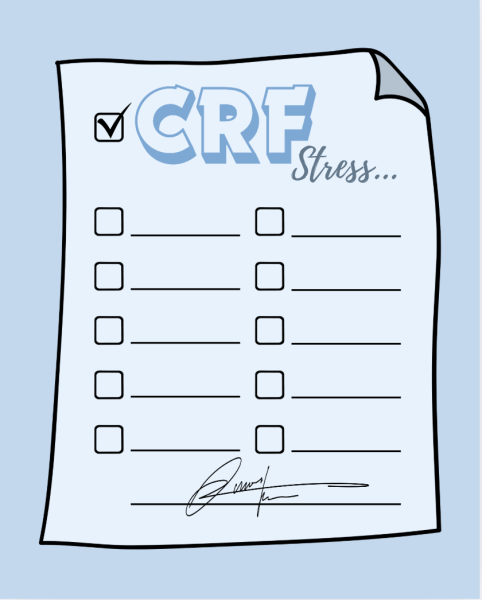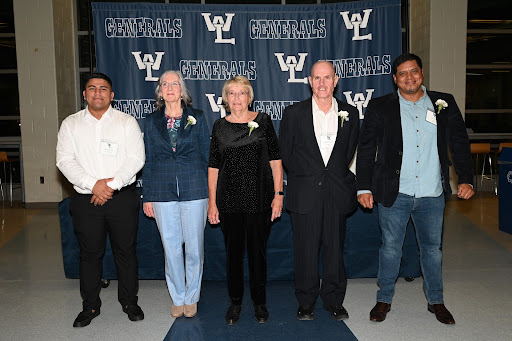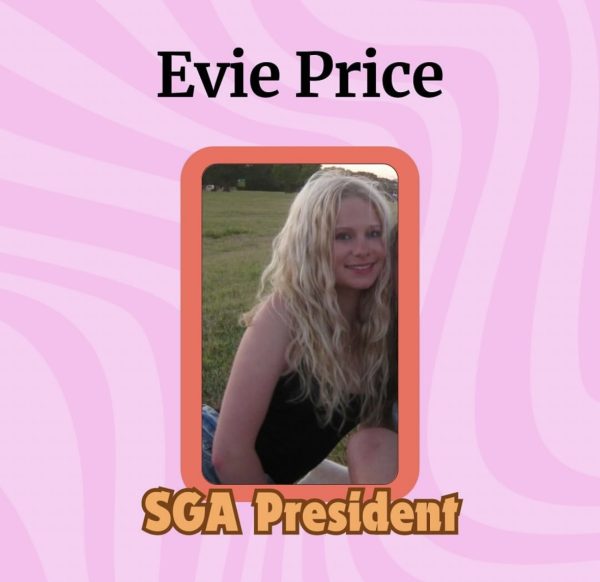Students react to Arlington closures
A playground in Bluemont Park displays a sign closing it to the public. Arlington closed park facilities, including parks, playgrounds, fields, restrooms, tracks, dog parks and athletic courts, along with schools on March 23. Governor Ralph Northam issued a stay-at-home order on Monday, March 30, making it a misdemeanor to congregate in groups of more than ten in both public and private areas, whether indoor or outdoor.
On March 23, Governor Ralph Northam announced that all Virginia schools will be closed for the duration of the academic year. This announcement was made as COVID-19 spreads around the country. As of April 3, there were 135 cases of COVID-19 in Arlington and 2,012 in Virginia. The abrupt stop to the school year left some students with relief and some with anxiety.
“My first reaction was of relief; I had expected it as a few days earlier Maryland schools had done the same thing,” senior Katherine Johanek said. “At the time I was out of town in Georgia for a wedding and was concerned if I needed to stay home for two weeks to see if I was sick, as I have friends who are immunocompromised. Being told that we were off for three weeks (including spring break) allowed me to relax.”
Now that Arlington Public Schools (APS) is closed for the remainder of the academic year, it is unclear how annual senior events such as graduation will occur, and many perks of being a senior, such as prom, have been canceled.
“I was honestly super shocked and disappointed [when I heard that school was out],” senior Maddie Koch said. “I didn’t think it would actually happen and when it did I was devastated that I couldn’t really live part of my senior year.”
Once the closure began, students reacted to the pandemic differently. According to a survey done by the publications staff through Canvas of 100 of the school’s students, forty percent said they are only leaving their house for essential goods, 21 percent said they are staying with their families and not going out, three percent said they are continuing to go out and thirty percent said they have done a mix of these actions. Ninety-four percent of students report spending their free time doing homework.
“I’m disappointed in the amount of time I spend on homework,” junior John Matuszewski said. “I was expecting a break. Now I have to worry about my family’s health and homework when I should be able to only have to manage one. Some teachers assume we have tons of time to kill in the next month because we’re off and assign us lots of homework, but that’s just not the case.”
Students also reported a variety of emotions: 35 percent reported no feelings of anxiety, 34 percent reported feeling anxiety sometimes and 24 percent of students reported feeling anxious.
“It kind of feels like the beginning of an apocalypse movie where everyone talks about the last ‘normal’ days before everything falls apart,” sophomore Grace Gent said.
Though school can be a source of stress for students, many reported missing certain aspects of their normal day.
“I miss learning in a classroom and being able to talk to my teachers in person,” junior Shea Messman said. “I miss Mr. [Philip] Krauth’s lectures and the discussions in our English class. I miss Mr. [James] Zarro’s jokes and Ms. [Chrissy] Steury asking everyone how they are. I miss seeing my friends everyday.”
As of March 16, the Center for Disease Control (CDC) recommended all events of more than ten people should be canceled, and asked people to practice social distancing by not socializing in person. Following Governor Northam’s executive orders to implement these suggestions, some students have experienced significant changes in their lives.
“[I miss] hugging my best friends,” sophomore Kayla Combs said. “I still go to see them from time to time but not being able to be close to them makes everything feel lonely and boring. It feels the same as if talking to them through a computer screen.”
Furthermore, the changes in society outside of school have been noted by students. Non-essential businesses have closed, and restaurants in the area have either resorted to delivery or pick-up only, or have chosen to totally close. These closures have left formally busy centers of business relatively empty.
“I never realized how much I loved hearing cars drive past me and feeling the breeze they left until the streets were empty,” senior Katherine Martinez said.
There are many uncertainties to come. It is not clear how fourth quarter grades or virtual schooling will continue. Some colleges have agreed to waive requirements to submit SAT or ACT scores during the admissions process next fall following the tests’ cancellations. Advanced Placement (AP) exams have moved to an online, forty-five minute format and International Baccalaureate (IB) exams have been cancelled. According to Politico, experts have predicted changes across the globe due to COVID-19 even after the pandemic has been controlled. These changes could impact places of worship, cause an increased strength in the federal government, a decrease in individualism and an increase in virtual events. The changes could even include the potential normalization of telemedicine and virtual meetings of Congress. Many students responded that the pandemic will stick with them long after the spread is controlled.
“I will never forget the all-around feeling of uncertainty and fear, even from adults, that came from this outbreak,” sophomore Kimi Reed said. “In addition, I’ll remember the feeling of unity (or maybe just a shared empathy) that came from this experience, because so many people around the world are sharing in the experience of this pandemic. Everyone is trying to deal with it in their own way and we’re all trying to help each other stay healthy.”


